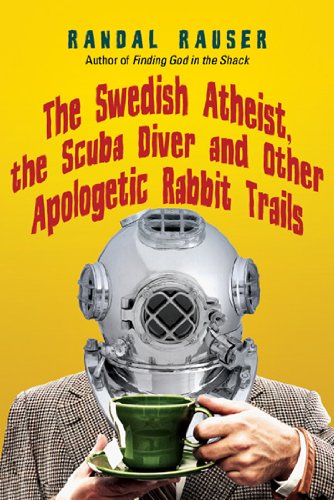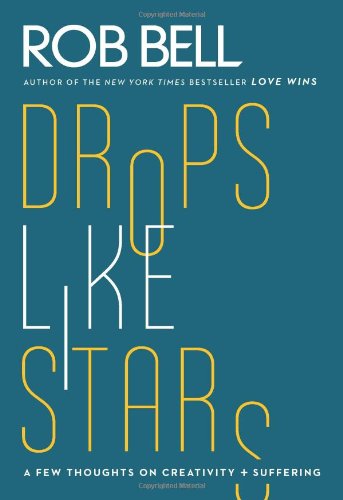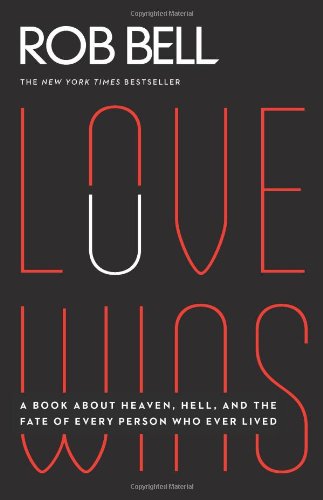Book review: The Swedish Atheist, the Scuba Diver and Other Apologetic Rabbit Trails
by Randal Rauser
★★★★★
My kind of Christian apologetics! A friend on Goodreads recommended this book to me, and he guessed right. I loved it.
Rauser leads us into a quaint little coffee shop for an afternoon of friendly argument, where he spies the perfect target: an atheist named Sheridan who is versed in apologetics just enough to make the conversation interesting. Sheridan argues that the geographic distribution of various types of believers proves that religion isn’t objective; he wonders why Zeus isn’t just as likely to be a real god as Rauser’s Most Perfect Being; he insists that morals are an evolutionary accident, with no need for divine intervention; he confronts Rauser with the problem of evil, and in particular the absurdity of everlasting punishment; and he argues that what Christians recognize as signs from God are no more than coincidences. Except for the whole “Yahweh condones evil” thing (where Rauser’s best defense is to shrug and admit that he’s not a defender for the “home team” but rather a pursuer of truth), Sheridan’s objections to Christianity get shot down.
You might recognize already that Rauser’s idea of apologetics is not about debating atheists until they succumb to logic and beg for baptism, but “rigorously pursuing truth in conversation.” This book isn’t going to shoot the moon. None of that “I can prove Jesus rose from the dead” stuff. Just reasonable exploration leading to a reasonable conclusion that Christian beliefs are not unreasonable.
I hope you don’t take this as a spoiler, but here’s my take on the coffee house conversation: Rauser provides some solid argument for the possibility of some sort of unexplained, intelligent creator and guide, who could be just about anyone but Yahweh of the Old Testament (as least the way its writers understood Him, since surely a “perfect being” wouldn’t really condone the genocide that was done in His name). Some arguments are better than others, and like I said, Rauser provides no conclusive proof that Christianity is the One True Religion. So, we’re left with a mystery, but one that should at least keep us from sneering at those who choose a Christian interface with this mystery.
All in all, this is a really fun book. Randal, if you write more, please consider more Dubious Disciple reviews!

Book review: Drops Like Stars
by Rob Bell
★★★★★
Here’s a short little booklet you can read over your lunch hour. Rob Bell, the controversial emergent mega-church pastor and best-selling author of Love Wins, tackles the subject of grief.
Bell is a minister, but doesn’t turn this into a book about God. It’s not tough love and it’s not sappy sentiment. Just words to think about and draw inspiration from.
If you’re thinking about buying this as a gift book, I wouldn’t say that it’s appropriate for the deep-in-grief stage, but rather the help-me-stand-up-again stage. As Bell says, he’s less concerned about the “why this?” than the “what now?”
Never heard Bell preach, but I’m sure beginning to like him as a person. I guess that’s the important thing for a good spiritual adviser.

Book review: Love Wins
by Rob Bell
★★★★★
This is Bell’s controversial masterpiece about “heaven, hell, and the fate of every person who ever lived.” Love, says this internationally influential pastor, wins in the end … and nobody has to go to hell.
God wants all people to be saved. Will God get what He wants?
Of Bell’s works, I’ve read only this and Velvet Elvis, though I have three more in my review stack. I’ll be spreading them out over the next few months. I confess that too much Bell, with his colloquial rah-rah style, might push me off the deep end, but in Love Wins, the message overcomes the style and earns five stars. I also feel the book is very well organized, leading inexorably to a logical conclusion.
That said, this book does not probe any deep theological arguments. It’s far too short for that. It’s a common-sense approach to a troubling question: Can God be both loving and vengeful?
Actually, Bell’s book is chock full of questions! It makes you think about your perception of Jesus, of God, and of His eternal plan. Bell says, “Often times when I meet atheists and we talk about the god they don’t believe in, we quickly discover that I don’t believe in that god either.” When we hear that a certain person has rejected Christ, we should probably first ask, “Which Christ?” The antiscience, antigay one standing out on the sidewalk with his bullhorn, telling people that they’re going to burn forever? Or the one who invites everyone to share in his heaven?
Which invites another question. Which heaven? The one far away, a dream of eternal bliss, or the one Jesus constantly spoke of, here, now, on this earth? Bell’s “heaven” is very “earthy,” rightly recognizing that Jesus spoke not of a place but of an age … an age where God dwells with his people, on this earth. Bell is not denying an afterlife, he simply is putting the focus where Jesus did: the now.
But what about hell? Well, there’s plenty of hell on earth now, too. Surprisingly, not everyone prefers heaven. Love wins, and we get whatever we want. But over and over and over, God speaks of restoration … helping those who have slipped into hell back on their feet and back into heaven.
That’s God’s agenda. So here we are at a final question: Does this magnificent, mighty, marvelous God fail in the end?














 354 Circles
354 Circles
 603 Goodreads Friends & Fans
603 Goodreads Friends & Fans

 Hello! I'm an author, historical Jesus scholar, book reviewer, and liberal Christian, which means I appreciate and attempt to exercise the humanitarian teachings of Jesus without getting hung up on any particular supernatural or religious beliefs.
The Bible is a magnificent book that has inspired and spiritually fed generations for thousands of years, and each new century seems to bring a deeper understanding of life’s purpose. This is true of not only Christianity; through the years, our age-old religions are slowly transforming from superstitious rituals into humanitarian philosophies. In short, we are growing up, and I am thrilled to be riding the wave.
I avidly read all thought-provoking religion titles. New authors: I'd love to read and review your book!
Hello! I'm an author, historical Jesus scholar, book reviewer, and liberal Christian, which means I appreciate and attempt to exercise the humanitarian teachings of Jesus without getting hung up on any particular supernatural or religious beliefs.
The Bible is a magnificent book that has inspired and spiritually fed generations for thousands of years, and each new century seems to bring a deeper understanding of life’s purpose. This is true of not only Christianity; through the years, our age-old religions are slowly transforming from superstitious rituals into humanitarian philosophies. In short, we are growing up, and I am thrilled to be riding the wave.
I avidly read all thought-provoking religion titles. New authors: I'd love to read and review your book!
 Hi! While Lee writes the articles and reviews the books, I edit, organize, and maintain the blog. The views expressed here are Lee's but I'm his biggest supporter! :-)
Hi! While Lee writes the articles and reviews the books, I edit, organize, and maintain the blog. The views expressed here are Lee's but I'm his biggest supporter! :-)
Connect With Me!